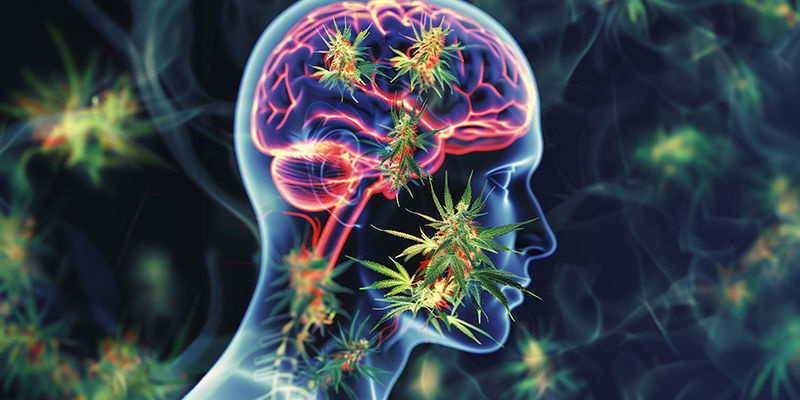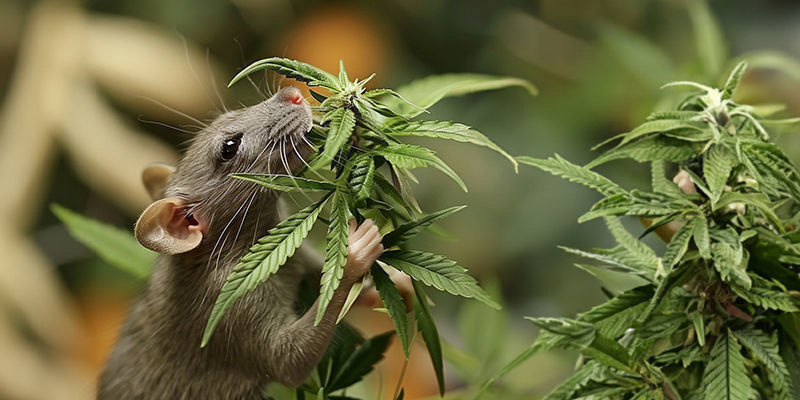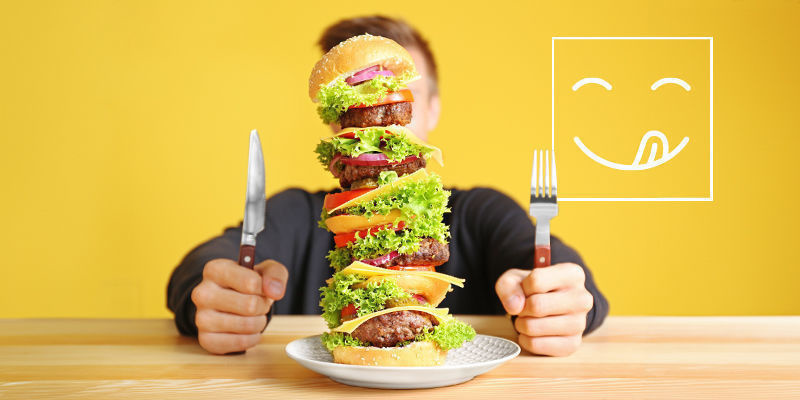
Why Does Cannabis Give You The Munchies?
Cannabis and the munchies go hand in hand, but what is it about our cherished herb that causes it? Well, scientists have done some digging and come up with some pretty comprehensive theories.
Ever been enjoying a joint only to find you have the sudden craving to go raid the fridge? That craving is a common phenomenon that is lovingly referred to as the “munchies”, and until fairly recently, science hasn’t been able to pin down exactly what causes it.
This is for good reason, because the munchies are actually the result of a combination of complex interactions between THC and the brain, which requires a lot of research in order to understand properly. What has been found, though, is that it all stems from the endocannabinoid system.
How does the endocannabinoid system fit into all of this?

The endocannabinoid system is something all humans have, and its receptors can be found throughout our body. It plays a part in regulating a myriad of bodily functions, such as pain, emotion, immune response, memory, and most relevantly here, appetite.
The cannabinoids within cannabis bind to the receptors of the endocannabinoid system, and thereby cause their various effects. These effects include getting high, sleepy, forgetful, and starting to giggle. It is when THC binds to certain parts of the endocannabinoid system that we get that irresistible urge to go through the pantry. The first part we are going to look at is the olfactory bulb within the brain.
Relating to hunger, CB2 receptors can be found in the mouth and the stomach (as well as most other places in the body). As you’ll see, it is not simply the location of these receptors that increase levels of hunger when high, but it is though that they play a role. Equally important, though, appear to be both CB1 and CB2 receptors found throughout the body and the brain.
Heightening taste and smell with the olfactory bulb

A team of European scientists have recently found that the olfactory bulb plays a pivotal role in cannabis related cravings (Gomez, 2014). They found, through experimentation on mice, that when THC binds to the olfactory bulb, it increases an animals’ ability to smell and taste food. Rats who were given THC were found to smell food scents for much longer, and eat more food, when compared to a control. They also found that mice who had been genetically engineered to not have any cannabinoid receptors in their olfactory bulb were no more interested in eating or smelling food than the control, even when given THC.
Further, a second, more recent murine study has identified that the mediobasal hypothalamic neurons are stimulated when THC actives CB1 receptors (Wheeler et al., 2023). Not only this, but it was observed that agouti related peptide feeding cells are likewise stimulated. It was concluded that these two factors probably play a large part in increasing appetite when THC is consumed.
Stimulating hunger

It isn’t just the olfactory bulb that increases our propensity to eat. Oh no, it is much more complicated than that! Other research has found that THC stimulation of the endocannabinoid system in the brain part called the nucleus accumbens increases the release of dopamine, which itself plays a part in appetite control, as well as the enjoyment we get from eating.
Another look into the munchies found that THC was having a similar effect on the hypothalamus, stimulating the production of ghrelin, which in turn stimulates hunger. There is even research to suggest that THC momentarily increases preference for fatty and sweet foods—explaining why you reach for the chips instead of a salad!
It’s worth noting that there is also speculation that at least some of the munchies results not from genuine hunger, but actually from dehydration. Dehydration is known to cause feelings of hunger even in sober people, and so it’s quite possible that these effects are simply amplified in those consuming cannabis. It’s certainly not the whole explanation, nor even most of it, but the next time you find you have an insatiable hunger when high, try drinking a glass of water and see how you feel.
Are there any benefits to increased appetite from cannabis?

The main benefit from the munchies is that, while high, great food tastes even better—which is surely a benefit in itself?
There is some speculation that cannabis’ ability to increase appetite may open the door to using it for potential medical purposes, where low appetite is a problem. However, as of yet it remains unclear how this would be implemented, especially given that isolating this effect is not currently possible.
The previously mentioned study from Wheeler et al. (2023) speculated that cannabis may be helpful in stimulating hunger for those undergoing chemotherapy. It is known that many chemotherapy patients have reduced appetites and face weight loss issues as a result.
Munchies: Par for the cannabis course?

Although these findings give us a good rounded idea as to why enjoying a bit of bud can have you ordering a family sized take-away meal, these are all just pieces of the puzzle that is still being put together. There is still a lot to investigate, and research needs to be carried out on human subjects, not just lab animals. But it is all very promising, as not only does this give us an insight into high-time habits, it also opens the door to potential therapeutic applications for marijuana, where appetite needs to be stimulated – such as with eating disorders or with reduced appetite after chemotherapy.
- Soria-Gómez, Edgar, Bellocchio, Luigi, Reguero, Leire, Lepousez, Gabriel, Martin, Claire, Bendahmane, Mounir, Ruehle, Sabine, Remmers, Floor, Desprez, Tifany, Matias, Isabelle, Wiesner, Theresa, Cannich, Astrid, Nissant, Antoine, Wadleigh, Aya, Pape, & Hans-. (2014, March). The endocannabinoid system controls food intake via olfactory processes - https://www.nature.com
- Wheeler, Emma C., Choi, Pique, De Howitt, Joanne, Gill, Sumeen, Watson, Shane, Yu, Sue, Wahl, Peyton, Diaz, Cecilia, Mohr, Claudia, Zinski, Amy, Jiang, Zhihua, Rossi, David, Davis, & Jon F. (n.d.). Cannabis Sativa targets mediobasal hypothalamic neurons to stimulate appetite - https://www.nature.com
-
 3 min
22 April 2017
How To Avoid Or Stop The Munchies When High
Everyone knows that smoking cannabis causes the munchies, right? Actually, not so fast. There is evidence that certain strains may not cause this effect. However, if you find that this urge just...
3 min
22 April 2017
How To Avoid Or Stop The Munchies When High
Everyone knows that smoking cannabis causes the munchies, right? Actually, not so fast. There is evidence that certain strains may not cause this effect. However, if you find that this urge just...
-
 2 min
28 September 2015
5 Cannabis Strains That WILL Give You The Munchies
It is well known that cannabis can stimulate the appetite, and some people want it guaranteed. So here are five strains sure get the job done.
2 min
28 September 2015
5 Cannabis Strains That WILL Give You The Munchies
It is well known that cannabis can stimulate the appetite, and some people want it guaranteed. So here are five strains sure get the job done.
-
 1 min
30 January 2015
Cannabis Strains That Don't Give You The Munchies?
Always looking for new ways to innovate, the burgeoning cannabis industry is looking to create a munchies-free strain of cannabis.
1 min
30 January 2015
Cannabis Strains That Don't Give You The Munchies?
Always looking for new ways to innovate, the burgeoning cannabis industry is looking to create a munchies-free strain of cannabis.
-
 4 min
10 September 2013
Top 10 Best Cannabis Recipes
Today, more and more people are using marijuana for various reasons. For the love of weed to the amazing benefits it offers to people dealing with chronic pain, incorporating cannabis into certain...
4 min
10 September 2013
Top 10 Best Cannabis Recipes
Today, more and more people are using marijuana for various reasons. For the love of weed to the amazing benefits it offers to people dealing with chronic pain, incorporating cannabis into certain...






 United States
United States











